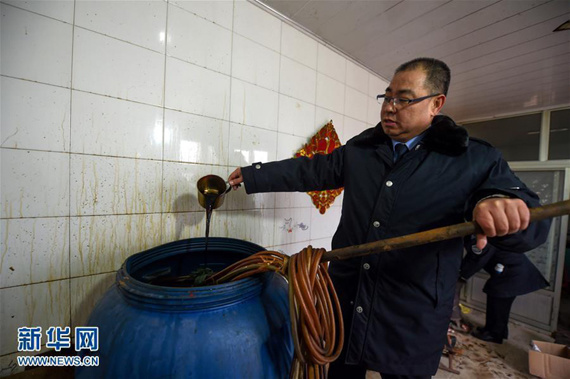Chinese police bust fake seasoning workshops
 0 Comment(s)
0 Comment(s) Print
Print E-mail CGTN, January 17, 2017
E-mail CGTN, January 17, 2017
Police in the northern Chinese port city of Tianjin raided six workshops allegedly manufacturing fake-branded sauces and flavorings using recycled spices and industrial salt on Monday, the Beijing News reported.
 |
|
Police in Tianjin raid six workshops allegedly manufacturing fake-branded sauces and flavorings using recycled spices and industrial salt on Jan. 16, 2017. (Photo/Xinhua) |
The raids came after the newspaper revealed a massive underground business manufacturing fake seasonings with labels of well-known trademarks in the small town of Duliu.
At one of the raided workshops, "vinegar" made from a blend of tap water, pigment, acetin and various additives was found in large exposed tubs in a messy low-rise building, the report said. All the workers had however escaped by the time the police arrived.
Beijing News earlier reported that products with labels from well-known domestic and international brands, such as Lee Kum Kee, Nestlé, Knorr, Totole and Wang Shouyi had been found in over 50 workshops in Duliu and been sold throughout the country.
The business had been in operation for over a decade, with a well-established sales network delivering an annual output of more than 100 million yuan (14.5 million US dollars). Local counterfeiters also alerted each other to any suspicious outsiders, making previous detection by the police difficult.
The tempting low wholesale prices of the fake seasoning products, much lower than online retail prices for the authentic products, created a high profit margin for distributors, driving the booming business in Duliu.
To ensure a significant profit, the counterfeiters resorted to cheap ingredients such as tap water and industrial salt, which is prohibited in cooking as it contains cancer-causing agents and heavy metals that can damage the liver and kidneys.
The factories also purchased leftover spices and herbs such as star anise, pepper and fennel from melon-seed processing factories in the nearby town of Wangkou, drying the ingredients and grinding them into powder for packaged spices.






Go to Forum >>0 Comment(s)